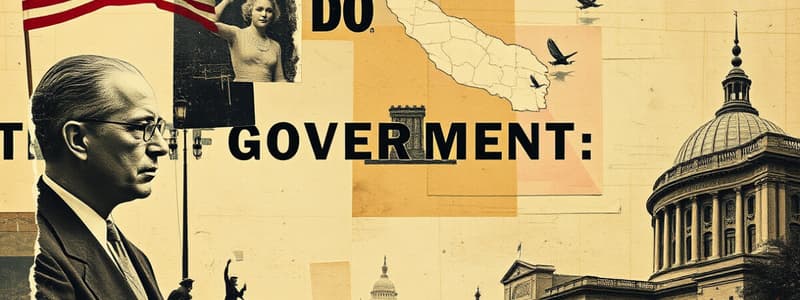Podcast
Questions and Answers
What does George Washington imply about government?
What does George Washington imply about government?
- It is primarily a tool for eloquence.
- It is entirely based on reason and legislation.
- It should be left to the judgment of the masses.
- It is comparable to fire, needing careful management. (correct)
According to Thomas Hobbes, what is the nature of people?
According to Thomas Hobbes, what is the nature of people?
- Dependent on external governance for morality.
- Self-seeking and power-hungry. (correct)
- Capable of altruism and self-sacrifice.
- Inherently cooperative and peaceful.
What did Plato believe about the best form of government?
What did Plato believe about the best form of government?
- Democracy is the most effective form of rule.
- A military dictatorship is essential in times of turmoil.
- A philosopher king should lead with reason and justice. (correct)
- An absolute monarchy ensures peace and order.
What is a key characteristic of government, as expressed in the content?
What is a key characteristic of government, as expressed in the content?
Which of the following describes Hobbes' view on protesting against monarchs?
Which of the following describes Hobbes' view on protesting against monarchs?
What is the main purpose of the social contract proposed by Hobbes?
What is the main purpose of the social contract proposed by Hobbes?
According to Hobbes, what happens if subjects attempt to reject their monarch?
According to Hobbes, what happens if subjects attempt to reject their monarch?
What does Hobbes imply about the relationship between subjects and their monarch?
What does Hobbes imply about the relationship between subjects and their monarch?
What does Hobbes define as injustice in the context of sovereignty?
What does Hobbes define as injustice in the context of sovereignty?
What does Hobbes imply about the nature of the social contract and the individual's rights?
What does Hobbes imply about the nature of the social contract and the individual's rights?
Flashcards are hidden until you start studying
Study Notes
Government and Its Nature
- George Washington described government as force, highlighting its dual nature as both a dangerous servant and a fearful master.
- Governance is fundamentally a collective agreement among society members on how to coexist and what rules to follow.
- Cynical view posits that government fundamentally revolves around power dynamics—who governs and the impact on others.
Human Nature and Government Forms
- Government forms often reflect prevailing views on human nature—considered either inherently evil or cooperative.
- Negative perceptions lead to authoritarian regimes designed to control populations, while positive views foster democratic systems with justice mechanisms.
Historical Perspectives on Government
- Philosophers like Plato and Aristotle laid foundational concepts for ideal governance over 2,000 years ago.
- Plato (428–348 BCE) observed societal conflicts between wealth classes, finding governance ranging from absolute monarchy to participatory democracy.
- He posited a philosopher king as the ideal ruler, criticizing democracy for its potential for self-serving leadership.
Thomas Hobbes' Philosophy
- Thomas Hobbes (1588–1679) viewed human nature as inherently warlike and self-interested, advocating for absolute monarchy as the most effective governance to maintain order.
- He believed individuals, driven by personal wants, require a strong ruler to prevent societal chaos and violence.
- Hobbes introduced the concept of a social contract, where individuals relinquish certain rights for collective security enforced by an absolute monarch.
Key Concepts from Hobbes
- Hobbes argued that subjects could not simply overthrow a monarch once they consented to their rule, despite potential tyranny.
- He emphasized that to undermine a monarch would disrupt the social contract and lead to injustice among subjects.
- In "The Leviathan," Hobbes elaborated on the social contract, stressing the importance of maintaining consent to avoid chaos.
Conclusion
- The evolution of governance reflects a complex interplay of philosophical thought, societal dynamics, and perceptions of human nature, from classical ideas of philosopher kings to Hobbes' advocacy for absolute power.
Studying That Suits You
Use AI to generate personalized quizzes and flashcards to suit your learning preferences.




